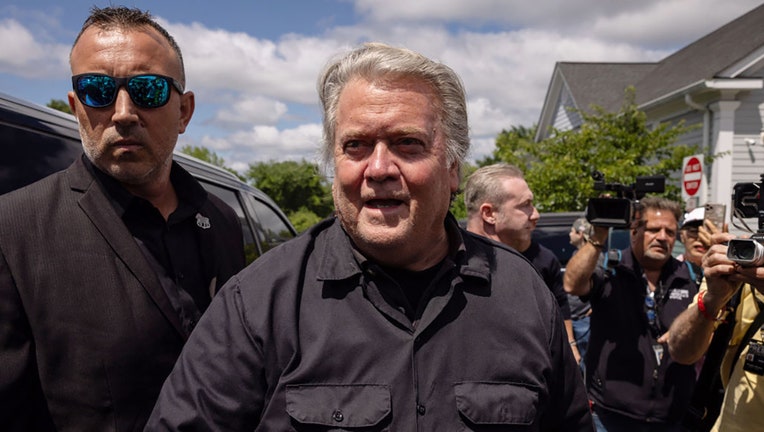Steve Bannon released from prison after serving contempt of Congress sentence

FILE - Former White House Chief Strategist Steve Bannon arrives at a press conference outside the federal correctional institution, on July 1, 2024, in Danbury, Connecticut. (Photo by YUKI IWAMURA/AFP via Getty Images)
DANBURY, Conn. - Steve Bannon, a former White House aide and longtime Donald Trump ally, was released from prison early on Tuesday after serving a four-month sentence for defying a subpoena in the congressional investigation into the U.S. Capitol riot on Jan. 6, 2021.
Exactly one week before Election Day, Bannon left the Federal Correctional Institution in Danbury, Connecticut, according to Kristie Breshears, a spokesperson for the federal Bureau of Prisons.
Bannon planned to hold a news conference later in the day in Manhattan, according to his representative, and is also expected to resume his "War Room" podcast on Tuesday.
Bannon, 70, reported to the prison July 1 after the Supreme Court rejected his bid to delay the prison sentence while he appeals his conviction.
He previously served as the chief executive officer of Trump’s 2016 presidential campaign and served as the White House's chief strategist for the first several months of the Republican president’s administration.
Trump is seeking to regain the presidency in next week's election against Democratic Vice President Kamala Harris.
What was Steve Bannon convicted of?

Steve Bannon, longtime Trump ally, found guilty of contempt charges
Steve Bannon, 68, faces up to two years in federal prison when he?s sentenced on Oct. 21. Each count carries a minimum sentence of 30 days in jail.
In 2022, Bannon was found guilty by a jury on two counts of contempt of Congress.
The first was for refusing to sit for a deposition with the Jan. 6 House Committee, and the second was for refusing to provide documents related to his involvement in Trump's efforts to overturn his loss to Joe Biden in the 2020 presidential race.
When he began serving his sentence in July, Bannon called himself a "political prisoner."
"I am proud of going to prison," he said at the time, adding that he was standing up to Attorney General Merrick Garland and a "corrupt" Justice Department.
A federal appeals court panel upheld Bannon's convictions in May. Bannon is now asking the full appeals court to hear his case. His legal team had argued that the congressional subpoena was invalid because Trump had asserted executive privilege.
Prosecutors, though, say Bannon had left the White House years before and Trump had never invoked executive privilege in front of the committee.
Bannon also faces criminal charges in New York state court, alleging he duped donors who gave money to build a wall along the U.S.-Mexico border. Bannon has pleaded not guilty to money laundering, conspiracy, fraud and other charges.
A trial in that case is scheduled to begin in December.

